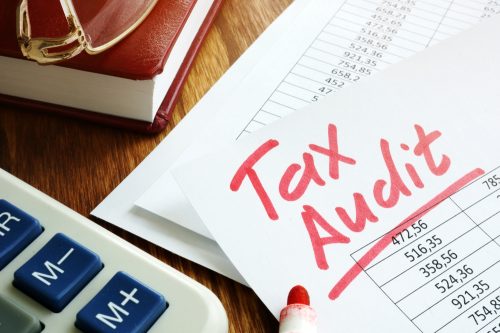IRS Releases Last-Minute Warning: These Claims and Forms Could Get You Audited
The agency has put together a list of the most common tax scams and schemes.

The end of the 2023 tax season is just around the corner, with less than two weeks left to submit returns. But if you're racing to get things done before the deadline, you should be aware of the potential pitfalls ahead. The Internal Revenue Service (IRS) is doling out some essential last-minute advice to taxpayers, and it includes warnings about the claims and forms that could get you into trouble. Read on to find out about the schemes that put you at risk of being audited by the IRS.
READ THIS NEXT: Taking These 2 Deductions Could Get You Audited by the IRS, Experts Warn.
The IRS warns that taxpayers should always be on the lookout for scams.

Every year, the IRS compiles some of the most common schemes taxpayers are likely to face in its Dirty Dozen list. "The Dirty Dozen represents the worst of the worst tax scams," the agency warns.
But while these cons become more prevalent during the tax season, the risks don't end once the season does. In an April 5 press release, the IRS announced that it has completed its 2023 Dirty Dozen list with a new warning urging taxpayers to continue watching out for these scams throughout the year.
"Many of these schemes peak during filing season as people prepare their tax returns," the agency explained. "In reality, these scams can occur throughout the year as fraudsters look for ways to steal money, personal information, data and more."
But if you haven't filed yet, you'll want to pay close attention to the schemes directly related to your tax return.
Some of the most common scams push misleading tax advice.

Scams surrounding fraudulent claims and forms are a common fixture on the Dirty Dozen list. According to the IRS, taxpayers this year should be concerned if they have been advised to claim two things on their returns: the Employee Retention Credit (ERC) and the Fuel Tax Credit.
As the agency explained in its new alert, scammers have being trying to convince people to claim these credits on their 2022 returns in an effort to increase refunds. But many taxpayers are not actually eligible for the ERC or the Fuel Tax Credit this year.
The IRS also warned that "misleading tax information" has been circulating on social media this season in an effort to get taxpayers to fraudulently file certain forms. This includes common documents like Form W-2, as well as those meant for a limited group, like Form 8944.
"Both schemes encourage people to submit false, inaccurate information in hopes of getting a refund," the agency said. "Taxpayers should always remember that if something sounds too good to be true, it probably is."
RELATED: For more up-to-date information, sign up for our daily newsletter.
These schemes could put you at risk of being audited.

Making false claims and filing fraudulent forms could put you at risk of being audited and fined.
"The IRS Criminal Investigation Division is always on the lookout for promoters and participants of these types of schemes," the agency warned in its new alert. "Where appropriate, the IRS will challenge the purported tax benefits from these types of transactions and impose penalties."
You may still be on the hook for consequences even if you've fallen victim to a scam, according to the IRS.
"Taxpayers should think twice before including questionable arrangements like this on their tax returns. After all, taxpayers are legally responsible for what's on their return, not a promoter making promises and charging high fees," the agency explained. "Taxpayers can help stop these arrangements by relying on reputable tax professionals they know and trust."
Other common cons could put your personal information at risk.

An audit isn't the only thing you need to worry about when it comes to the common scams targeting taxpayers this year. As IRS Commissioner Danny Werfel warned in the agency's new alert, "Scammers are coming up with new ways all the time to try to steal information from taxpayers."
This may include various phishing and smashing schemes—which you should be on high alert for even after tax season ends.
According to the IRS, con artists often try to impersonate tax and financial officials in an effort to target taxpayers.
"These messages arrive in the form of an unsolicited text (smishing) or email (phishing) to lure unsuspecting victims to provide valuable personal and financial information that can lead to identity theft," the agency explained. "The IRS initiates most contacts through regular mail and will never initiate contact with taxpayers by email, text or social media regarding a bill or tax refund."
Best Life offers the most up-to-date financial information from top experts and the latest news and research, but our content is not meant to be a substitute for professional guidance. When it comes to the money you're spending, saving, or investing, always consult your financial advisor directly.





















